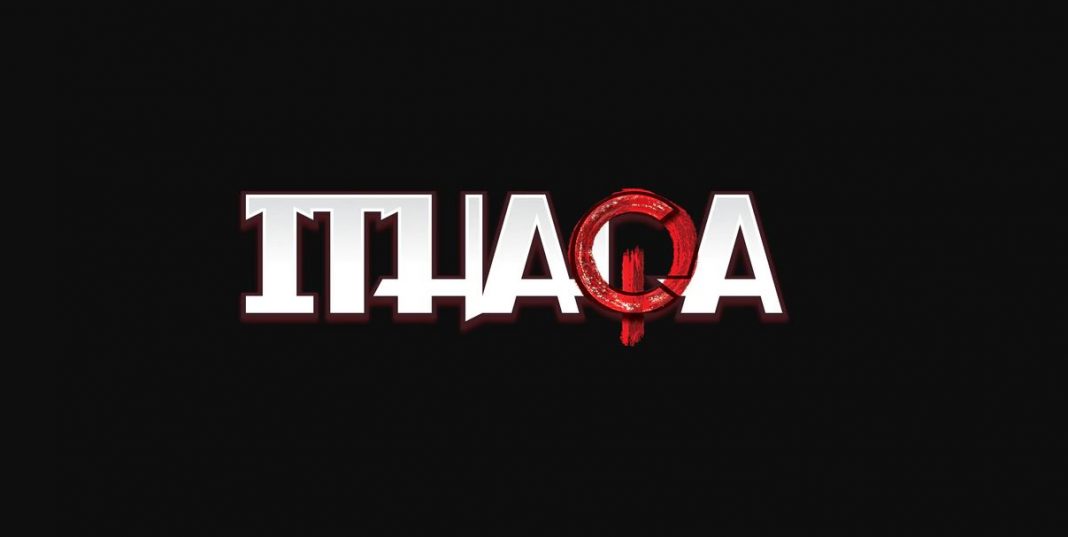When I first read Ithaqa I knew there was something different about the very nature of its Lovecraftian take on horror. From The Call of Cthulhu to The Shadow Over Innsmouth and even The Rats in the Walls, HP Lovecraft’s protagonists confront the true face of cosmic horror alone. That changes in writer Michael Watson, artist Theresa Chiechi, and letterer Lucas Gattoni‘s Ithaqa, a comic that takes special care to make sure its horrors are part of a shared experience among its characters.
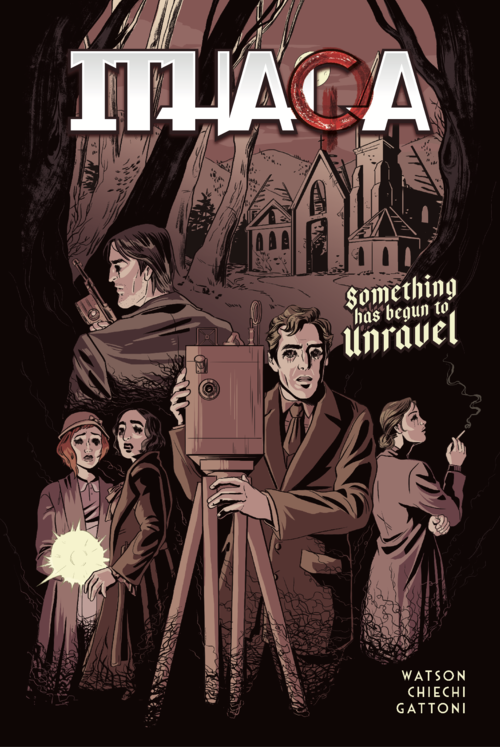
Ithaqa follows a struggling filmmaker who sets out to investigate a series of strange deaths alongside the likes of four impressively distinct women. Each woman possesses their own unique views on matters ranging from the supernatural to the political trajectory the 1920s are on. Instead of letting the filmmaker drive the story, Watson turns the investigation into a cooperative affair. Going the lone wolf route only guarantees a dark and grisly end for whomever decides to brave it.
In other words, if Ithaqa were a board game, it would require four players to play, with deep character creation playing a crucial role in its setup. Its story isn’t about the terror of isolation. It’s about the kinds of fellowships that can form in the presence of absolute horror.
This break from the classic mold brings Ithaqa into a different realm of Lovecraftian storytelling, and the book’s focus on historical world-building builds upon the famed author’s universe by giving it an even more lived-in feel than that found in some of Lovecraft’s original stories.
Chiechi’s art takes to Watson’s script with the same attention to detail to create a 1920s Prohibition setting that welcomes a darker excursion into the supernatural. All of this is to say, Ithaqa has a lot going on. Watson’s script, though, is up to the task of making the story move in the right direction, even if it means putting its core group on a path that leads to madness.
The Beat sat down with Michael Watson to get at what it takes to remix classic HP Lovecraft ideas into a comic that values teamwork when confronting ancient terrors.
Ricardo Serrano: Trying your hand at Lovecraftian horror must’ve been daunting given the volume of Lovecraft-inspired stories already available. What did you think made your story different enough to put it out into the world?
Michael Watson: There are two things. One of them comes from the idea that I believe we need to be telling more stories like the Fellowship of the Ring, with a lot of characters and a moving narrative.
Lovecraftian stories are typically solo adventures, where one person is super smart but doesn’t see any of the evidence regarding the mystery until it’s too late and then they go like, “Oh crap, I guess zombies are real.” They’re fun and I love them, but I really do want to tell stories about groups of people kind of coming together. A story where this monstrous evil could only be matched or defeated, as is the case in Ithaqa, with many women forming a coalition to confront it. It’s the opposite of Call of Cthulhu.
In many ways, it’s what makes the comic challenging to write. We’ve had to figure out the core values of the story to then have every character bring something to the table. They can’t really just be a useless character. It’s hard when you have five to seven important characters sharing the stage, you know?
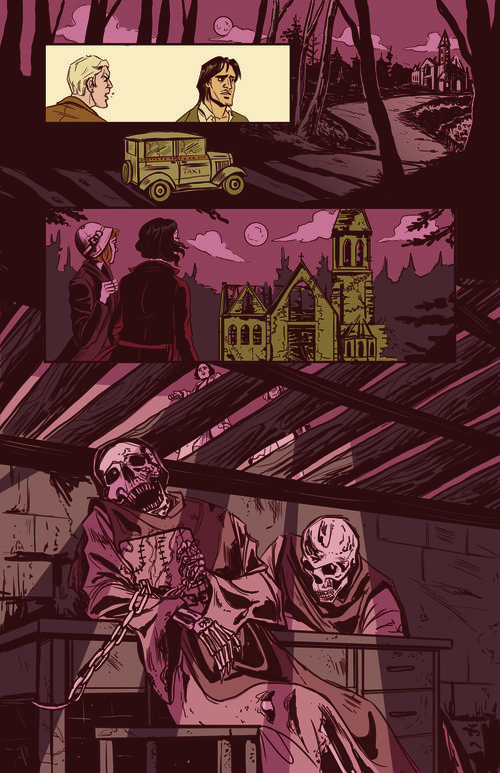
Serrano: What was the process behind character creation like, considering how you wanted to distance yourself from the solo-protagonist model Lovecraft mostly fell back on?
Watson: It was kind of interesting because I had been kicking around the idea for this story, initially, as a screenplay for a feature film. It started with a single female protagonist. I had written a short story set in modern day New York City about this person having these dreams in the city’s subways, like in Midnight Meat Train, with certain aspects of them breaking through reality. She would’ve been confronted by this Lovecraftian entity that was lurking beneath the city.
I was kind of grappling with what the story was. So, at the time I also really wanted to get into Dungeons and Dragons. I wanted to do spooky things. And so I turned to the Call of Cthulhu pen and paper RPG game. I started writing my narrative for the game sessions and the friends that were playing with me at the time were women.
So I looked at my friends and started thinking, ‘she would be like a suffragette in this world, another one would be an artist,’ and so I slowly came up with this fellowship that was very similar to kind of the people that joined me at the table to play.
While the characters that we see in the comic are not just copies of my friends’ characters, there’s definitely a connective line, like a thread going back to each of my friends and our Cthulhu game sessions.
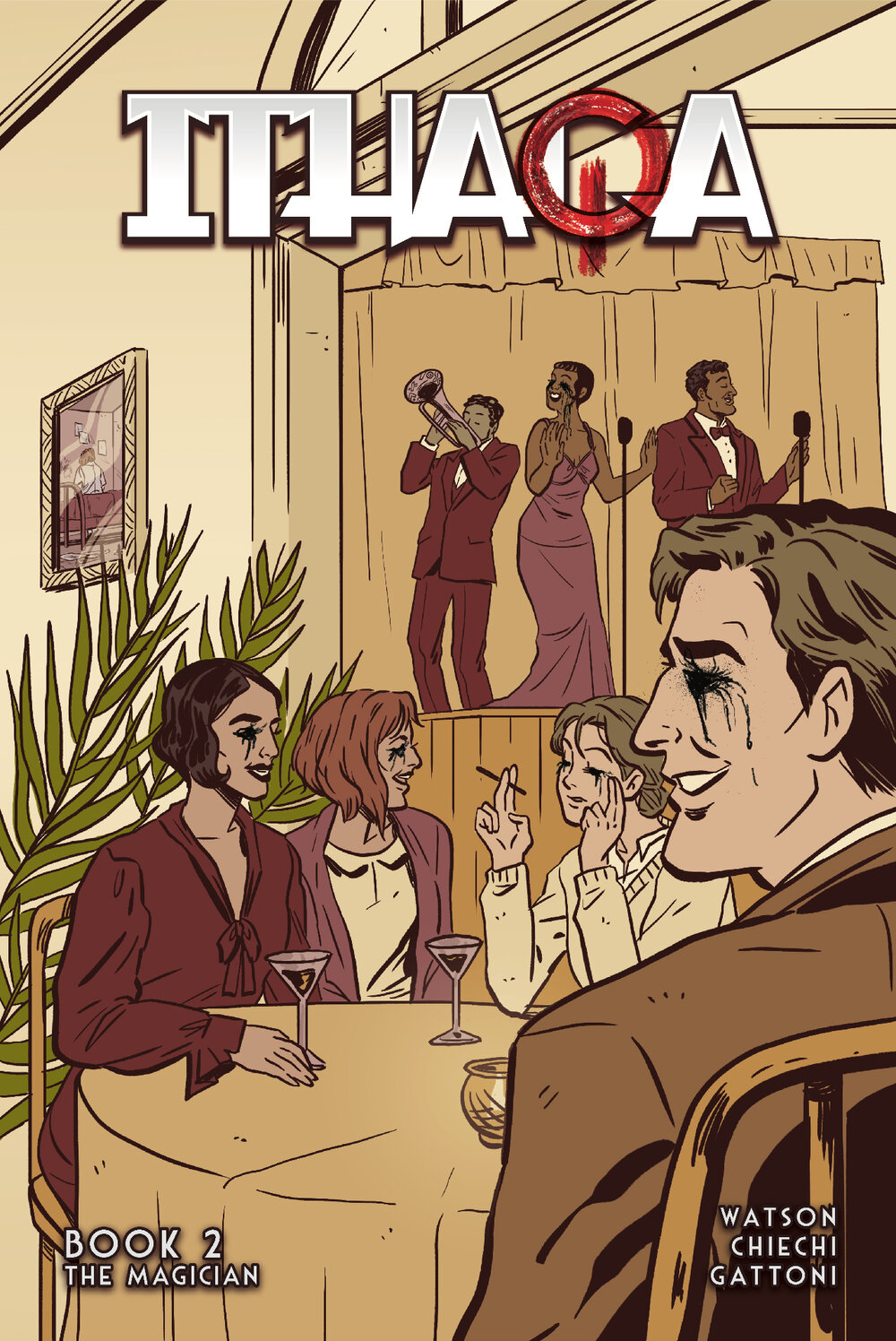
Serrano: One of the unique aspects of Ithaqa is its historical setting. The book feels like a Roaring Twenties tale because of the historical references present throughout. That’s not always present in other Lovecraftian tales, where the setting is basically a dark, shadowy town shrouded in mist with fish people walking around. What led you to dive into this type of world-building?
Watson: I wanted the story grounded in history and reality as best as I could. It’s something that can make stories with supernatural stuff all the more jarring and weird. When we spot things that we know were real, that actually happened, your brain kind of gets it really fast. It all feels just a bit more plausible.
The 1920s were just a really interesting period of time, especially with religious history and how it colored the things that were changing throughout the decade. You have women’s suffrage as well as prohibition happening at the same time, with huge changes being made to the Constitution. You have all these weird new technologies, but everything is still old. And yet there’s still this kind of old country feeling to life. Some people still had that grandma that believed in leprechauns walking around. We didn’t shake off our superstitions all the way.
I went to school to be a filmmaker up in Ithaca, which is where my love of this town and everything in it comes from. I always knew that there was a silent film studio that went out of business in the area. Just connecting with that history made me want to have my main character be a filmmaker, you know, so as to give a nod to the advent of cinema in the process. These bits of history just make the story feel more alive. They raise the stakes.
Serrano: What do you think works best about Lovecraft in comics? Is there something this medium does better than any other when it comes to Lovecraftian horror?
Watson: I think one of the things with comic books is that you really have to find an image that works and then know when to go all in, and then also know when to keep things hidden. Even when revealing the monster you have to ask yourself how much is actually good for the story. Too much exposure and you can end up ruining the story.
There’s a bit too much out there of just showing the Cthulhu monster, you know? It kind of misses the point. One of the reasons why you get Cthulhu at the end of The Call of Cthulhu, for instance, is because you already have all of this backstory and myth built up. When you get to finally see this thing, you’re like “yeah, that’s screwed up. We’re screwed. Our nightmares just became real.”
Lovecraft monsters are perfect for comics, but that doesn’t mean the adaptation or new story has to show Cthulhu every single page. Buildup is still important.
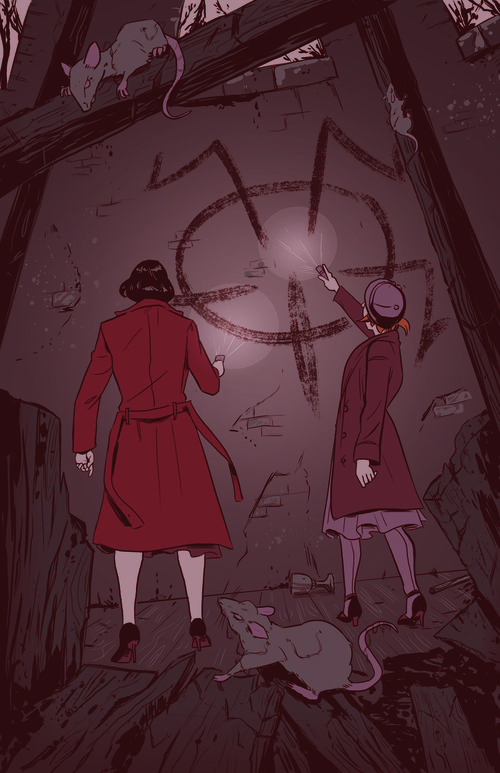
Serrano: What’s next for Ithaqa?
Watson: I think I know what’s going to happen, but how it happens might still surprise me at this point. After I read Stephen King‘s On Writing book way back when, he talked about his process a lot and how he doesn’t understand how there are writers who will do the full outline and then hit every bullet point.
I went for the Stephen King method instead, where you put your characters in a crazy situation and then see what comes out of it. What’s come out of it is a 12-issue series where things get more complex and ambitious as it goes along but with a clear line of sight as to where things are going.
The first three self-published issues of Ithaqa are available to purchase now in print and digitally via the series website, and digitally through Comixology.


